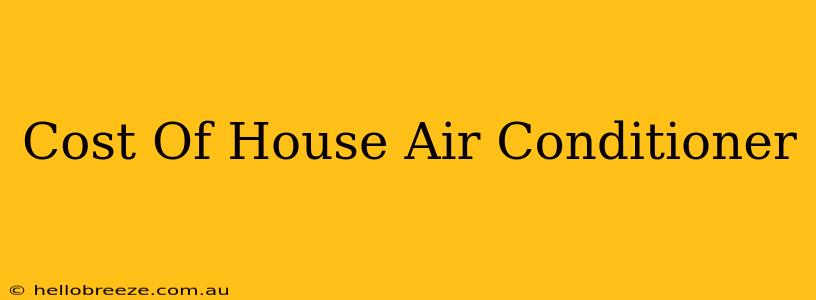Choosing the right air conditioner can significantly impact your comfort and energy bills. This guide breaks down the cost of house air conditioners, helping you make an informed decision. Understanding the various factors influencing price is crucial for budgeting effectively.
Factors Affecting the Cost of an Air Conditioner
Several key factors determine the final price tag of your new air conditioner:
1. Type of Air Conditioner:
-
Window Units: These are the most budget-friendly option, typically costing between $100 and $500. However, they are less efficient and suitable only for smaller spaces.
-
Portable Air Conditioners: Offering more flexibility than window units, portable ACs typically cost between $300 and $1000. They are still less efficient than central or ductless systems.
-
Central Air Conditioners: These systems are the most expensive upfront, ranging from $3,000 to $10,000+ depending on the size of your home and additional features. However, they provide the most efficient and even cooling.
-
Ductless Mini-Split Systems: A good compromise between cost and efficiency, mini-splits are ideal for zoning and adding cooling to rooms without existing ductwork. Expect to pay between $1,500 and $5,000+ per unit.
2. SEER Rating:
The Seasonal Energy Efficiency Ratio (SEER) measures an air conditioner's efficiency. Higher SEER ratings mean lower energy bills over time, although the initial cost will be higher. Look for units with a SEER rating of 15 or higher for optimal energy savings. Higher SEER ratings (20+) will command a higher upfront price.
3. Size and Capacity (BTUs):
The cooling capacity of an air conditioner is measured in British Thermal Units (BTUs). The appropriate BTU rating depends on the size of the space you need to cool. Underestimating the BTU requirement will lead to insufficient cooling, while overestimating will result in higher energy consumption and cost. An HVAC professional can help you determine the correct BTU rating for your needs.
4. Features:
Modern air conditioners offer various features that impact their price:
- Smart features: Wi-Fi connectivity, smart home integration, and programmable thermostats add to the cost.
- Dehumidification: Effective dehumidification can improve comfort, but some models offer superior capabilities, affecting the price.
- Air filtration: High-efficiency particulate air (HEPA) filters or other advanced filtration systems are added-cost features.
- Quiet operation: Sound level is a factor for many consumers; quieter units tend to be more expensive.
5. Installation Costs:
Installation costs vary depending on the type of system and the complexity of the installation. Expect to pay several hundred dollars for window or portable units, but potentially thousands for central or ductless systems. Factor in permits and any necessary ductwork modifications or replacements.
6. Professional vs. DIY Installation:
While some simpler systems can be installed DIY, professional installation is highly recommended for central and ductless systems. Improper installation can void warranties, compromise efficiency, and even create safety hazards.
Tips for Saving Money on Your Air Conditioner
- Compare prices from multiple suppliers: Get quotes from at least three different HVAC contractors.
- Look for rebates and incentives: Utility companies and government programs may offer rebates for energy-efficient AC units.
- Consider financing options: Some retailers offer financing plans to make the purchase more manageable.
- Maintain your air conditioner: Regular maintenance can extend the lifespan of your unit and improve its efficiency.
By understanding these factors and following these tips, you can make a smart and informed decision when choosing and purchasing your new house air conditioner. Remember, the initial cost should be weighed against long-term energy savings and comfort levels.

